Redditor Wonders If It's Wrong to Care More About Their Dead Dog Than Their Dad Who Has a Lung Issue with Potential Heart Failure
When it comes to our animal companions, many of us share a deep affection and bond with them. For us, a pet is more than "just a dog" or "just a cat."
It's a beloved member of the family who enriches our lives with companionship, amusement, and joy. A pet can provide structure to your day, keep you active and social, help you navigate life's obstacles and challenges, and even give you a sense of meaning or purpose.
Therefore, it is common to experience intense sorrow and loss following the death of a beloved pet. The pain of loss frequently feels overwhelming and can bring on a wide range of distressing and challenging emotions.
Although losing a pet is an inevitable part of pet ownership, there are healthy ways to cope with the pain and grief, and when the time is right, you might even be able to open your heart to another animal companion. Meet u/MaxAnimator, the OP in today's story, who lost their dog.
Looking at the OP's post, one can see that they were solely focused on discussing the deceased dog. Despite the title indicating that the OP's dad was in the hospital due to a lung issue and a potential heart problem, the entire post revolved around the OP's dog.
It was filled with regrets, as the OP didn't quite know whom to blame for the dog's death. Read the entire story as you scroll down.
Here is the OP asking if they're wrong for caring more about the dog's death than the dad's health.
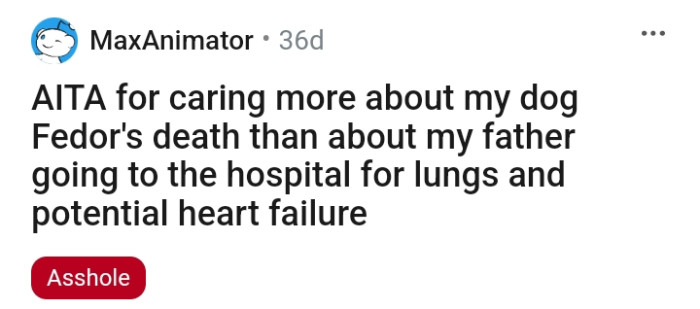
The OP stated that no one tried to revive the dog but still admitted that it would have been too late.
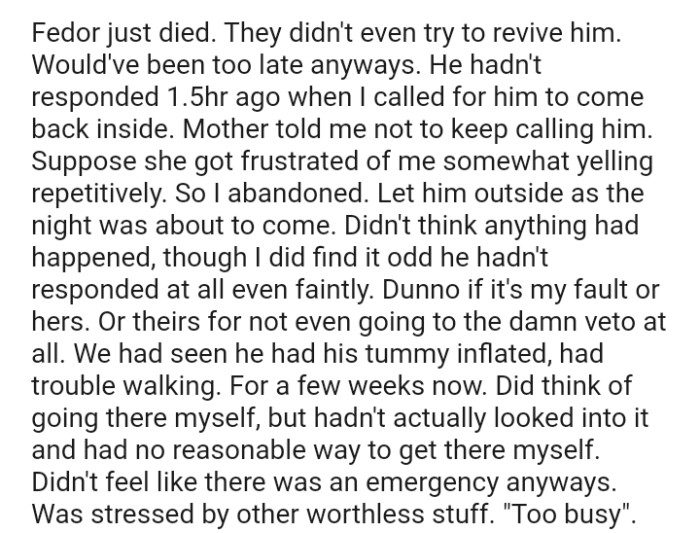
The OP considers someone so self-centered that they call to talk about themselves rather than the dog.
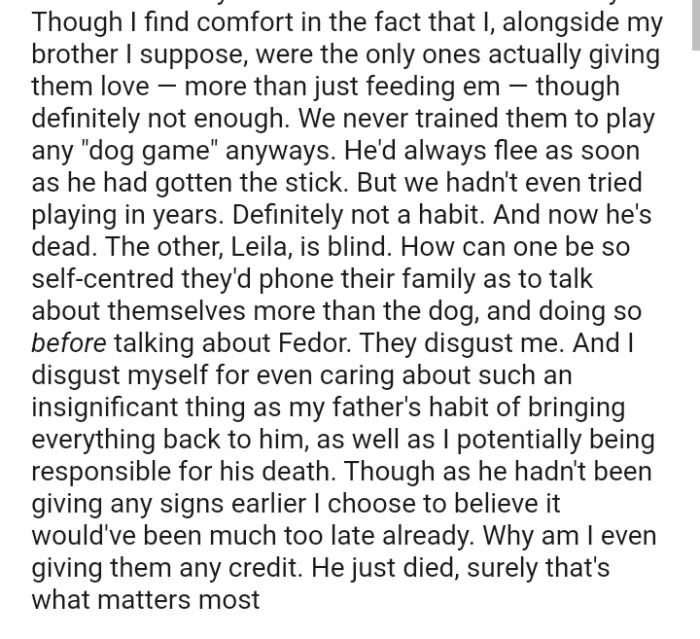
Grief and Its Complexities
Dr. Michelle Andrews, a psychologist specializing in grief, notes that the loss of a pet can evoke feelings that are often dismissed or minimized by society.
Research shows that the attachment we form with pets can parallel those with humans, making their loss deeply impactful.
This complexity can lead individuals to feel conflicted about their emotions, especially when comparing their grief to that of human losses.
You should never feel guilty or ashamed about grieving for an animal companion, even though some people might not understand the depth of feeling you had for your pet. The degree of grief you experience will often depend on factors such as your age and personality, the age of your pet, and the circumstances of their death, even though everyone reacts to loss differently.
Here are comments from Redditors in response to the Reddit story.
This Redditor made sure to point out that the OP didn't even mention the father.

This Redditor wants to know what's really going on because the whole situation seems confusing.
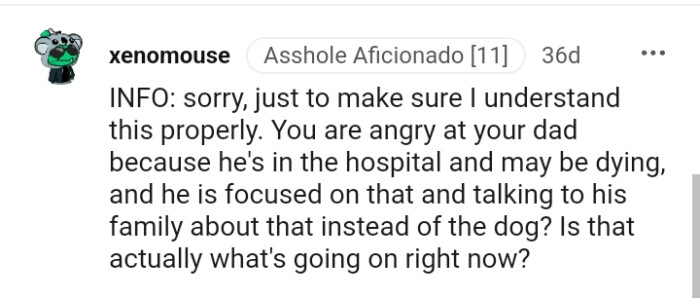
The OP's dad has a right to be more concerned about himself than an already deceased dog.

The Journal of Abnormal Psychology published studies indicating that grief can trigger a range of emotional responses, from deep sadness to anger.
These responses can be especially intense when individuals feel they cannot openly express their grief, leading to feelings of guilt or shame.
Understanding these emotional responses can help individuals process their grief in a healthier manner.
Everyone is just expressing what they understand. For this Redditor, the OP's mum must have been annoyed about the OP yelling.

This OP wants to know why the OP didn't go and check on the dog personally.
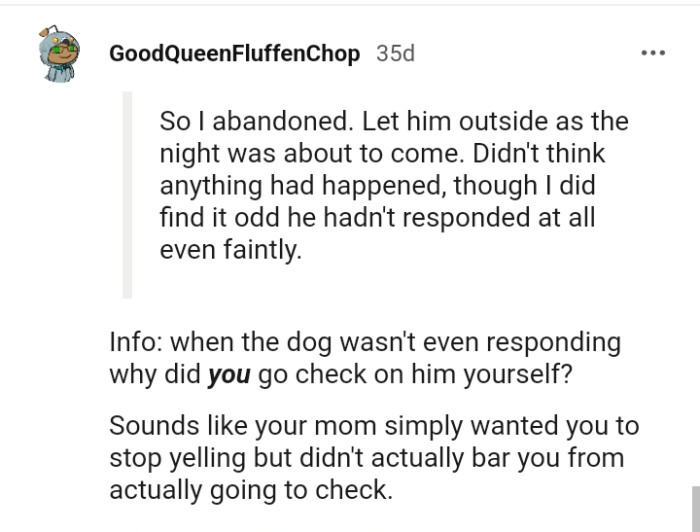
In general, the greater the emotional anguish you experience, the more important your pet was to you. The OP must really be in so much pain, but the Reddit post was just all over the place, so we can't definitively say where the problem is coming from.
Still, a verdict must be passed, and the OP was declared the AH. Do share this post if you agree with the final verdict.
Navigating Family Dynamics During Grief
Family dynamics can complicate the grieving process, as different members may exhibit varying levels of emotional expression.
Dr. Sarah Williams, a family therapist, emphasizes that open communication is essential for navigating these dynamics.
Her research indicates that families who engage in conversations about their feelings can strengthen their bonds and provide mutual support during times of loss.
To navigate grief in a family context, experts recommend holding family meetings where everyone can share their feelings and experiences.
Creating a safe space for expression can help validate each person's grief, fostering understanding and healing.
Additionally, engaging in shared memorial activities can strengthen family connections while honoring the lost pet.
Psychological Analysis
This situation underscores the significant emotional weight that can accompany the loss of a pet, reflecting deeply rooted attachments that deserve recognition.
Encouraging open dialogue about grief can facilitate healing and strengthen family connections during difficult times.
Analysis generated by AI
Analysis & Alternative Approaches
Understanding the complexities of grief, particularly concerning pets, can help individuals navigate their emotions more effectively.
Recognizing that these feelings are valid and deserving of expression is crucial in the healing process.
Ultimately, fostering open communication within families can enhance support during times of loss.



